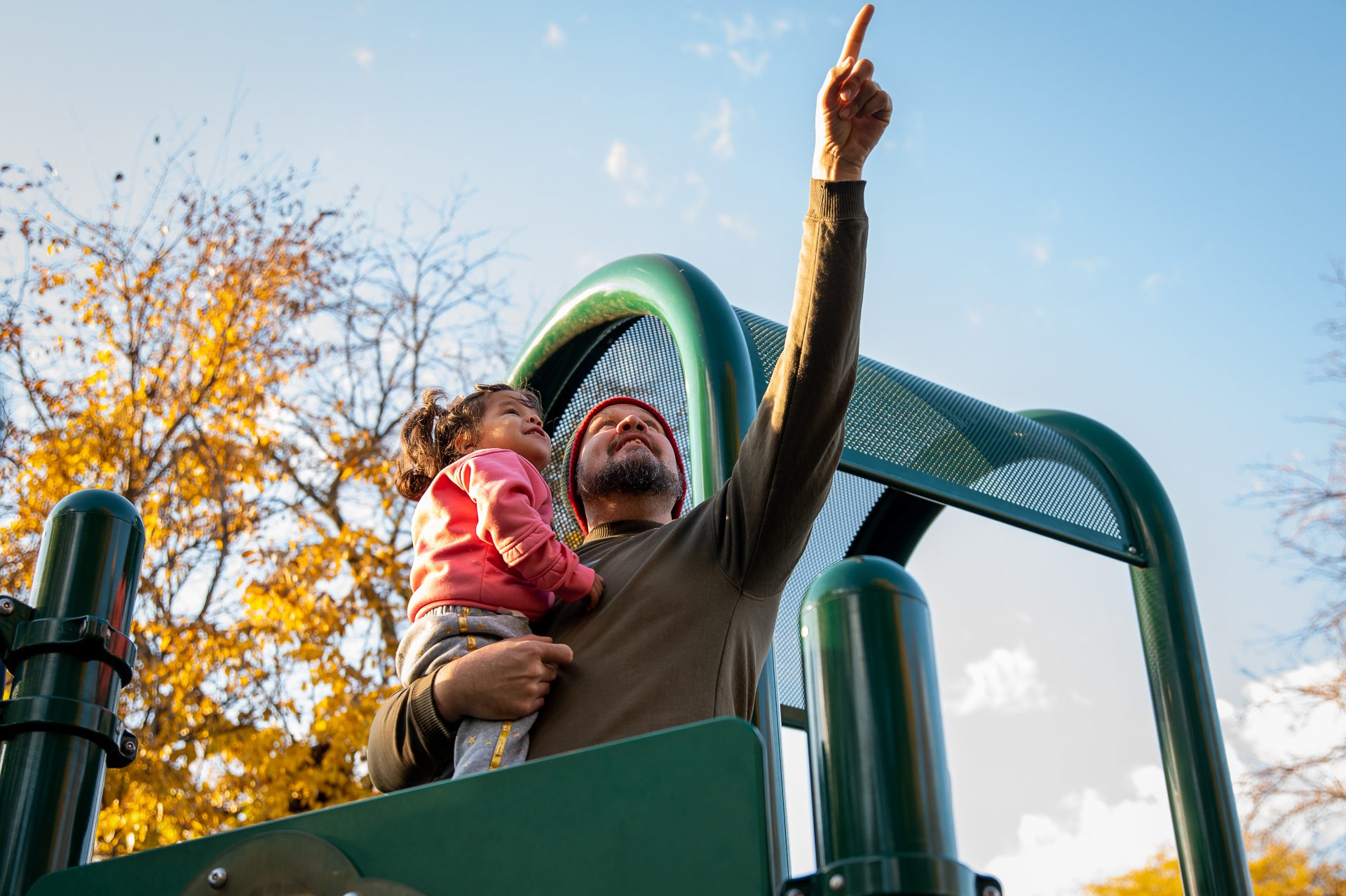 Jonathan Aguilar para Borderless Magazine
Jonathan Aguilar para Borderless MagazineTras años de emigración, Tomás Alvarado y Carmen Ollarves vuelven a Chicago con su hija pequeña.
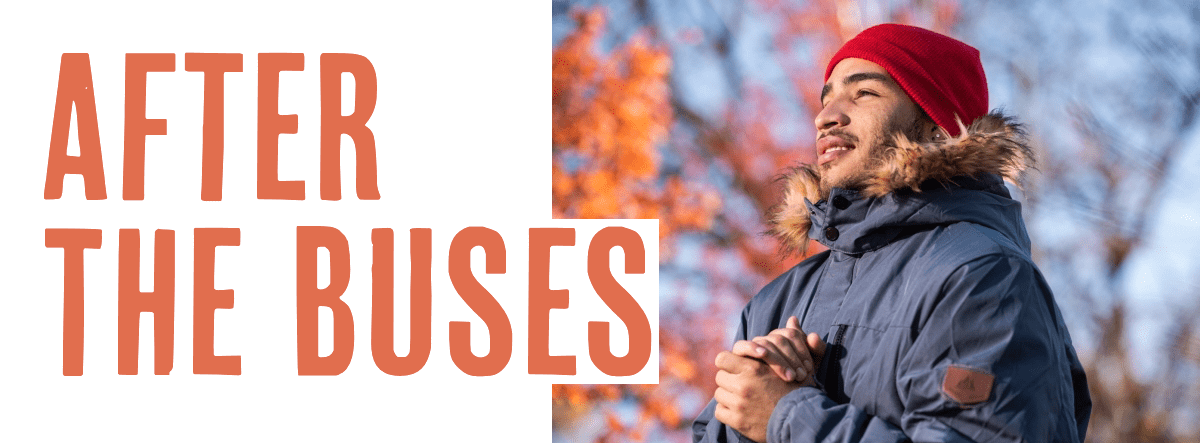
Un lunes por la mañana, Tomás Alvarado y su esposa Carmen Ollarves llevaron a Grecia, su hija de 2 años, a un parque infantil de Portage Park, en la zona noroeste de Chicago. Siempre que el tiempo lo permite, la llevan allí.
Noticias que ponen el poder en el punto de mira y a las comunidades en el centro.
Suscríbase a nuestro boletín gratuito y reciba actualizaciones dos veces por semana.
La familia llegó a la frontera sur de Estados Unidos hace apenas unos meses. Pero salieron de Venezuela por primera vez en 2018. A pesar de tener tres trabajos entre los dos en Venezuela, apenas habían podido dar una comida a la semana a su familia. Junto al hermano de Carmen, Luis, la pareja viajó a Perú a pie para escapar del régimen autoritario del presidente venezolano Nicolás Maduro.
Tomás y Carmen seguían luchando por llegar a fin de mes en Perú. Carmen recuerda que sus empleadores la rechazaban por sus raíces venezolanas. Tras cuatro años luchando por ganar lo suficiente para comprar comida y pagar su casa, la familia decidió abandonar Perú e intentar cruzar a Estados Unidos.
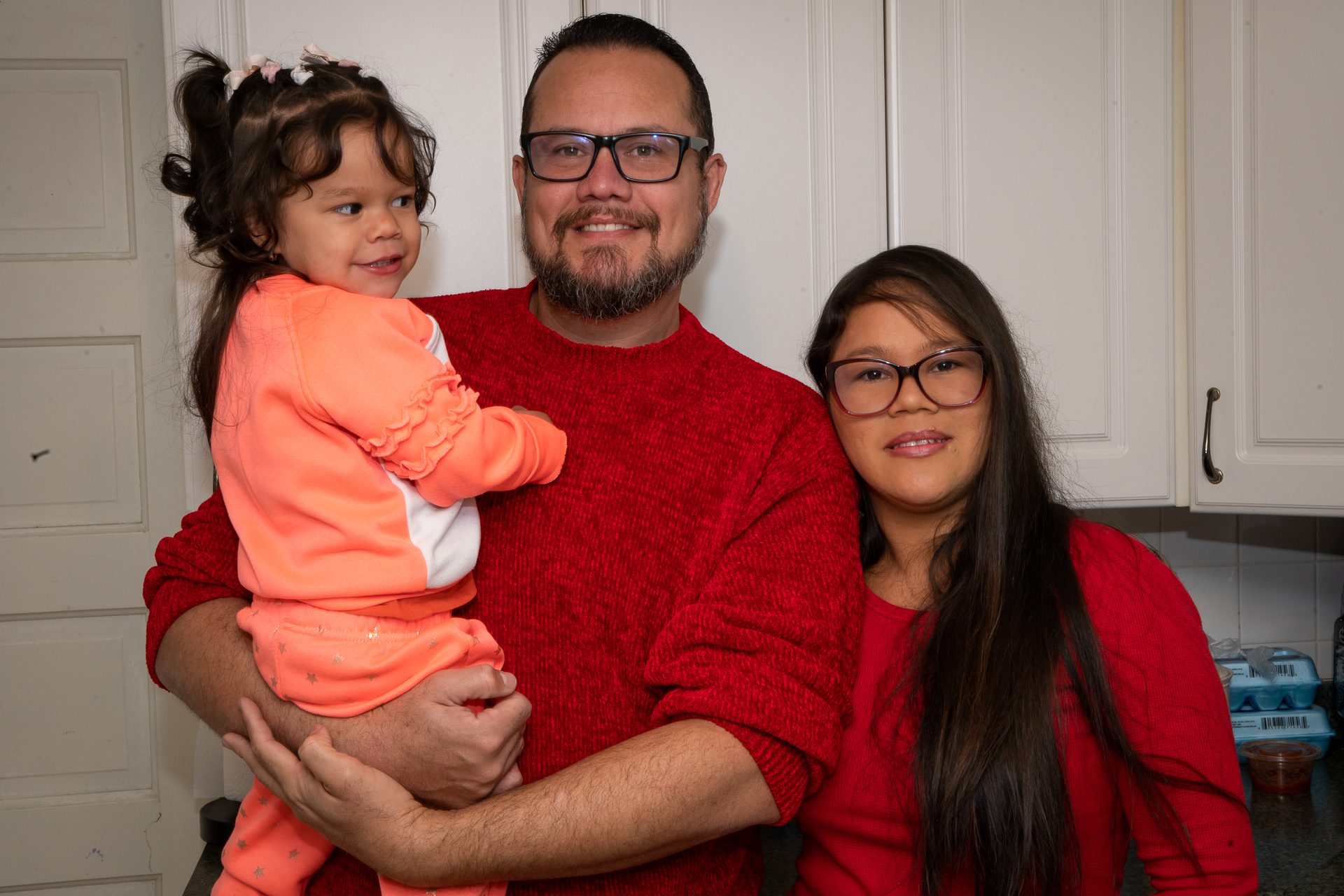
Cuando Alvarado y su familia caminaron hasta El Paso, Texas, fueron detenidos y retenidos por la Patrulla Fronteriza estadounidense durante tres días. Luis permaneció allí tres semanas.
La única persona que conocían en Chicago era una antigua vecina de Perú, que se había trasladado a Estados Unidos años antes. Armados con su dirección, pudieron salir del centro de detención de inmigrantes diciendo a los asesores de UNICEF que tenían patrocinadores esperándoles en Chicago. Nadie les pidió pruebas.
Un par de días después, un martes de agosto de 2022, los tres llegaron al aeropuerto internacional de O'Hare.
Borderless habló con esta familia de tres miembros sobre cómo llegar a fin de mes en Sudamérica, su viaje a Chicago desde Perú y sus esperanzas para el futuro.
TOMÁS ALVARADO: Nos conocimos en Caracas. Trabajábamos en Locatel, una farmacia muy conocida. Carmen era auxiliar de farmacia y yo de seguridad. También trabajé en Pizza Hut. Carmen y yo nos conocimos como compañeros de trabajo y nos fuimos conociendo poco a poco hasta que empezamos una relación.
CARMEN OLLARVES: En Venezuela, en nuestros días libres, solíamos ir al cine cuando podíamos, antes de que la situación se volviera crítica. Cuando empezamos nuestra relación, yo vivía en Maracay y él en Caracas, a unas dos horas de distancia. En nuestros días libres viajábamos a casa de mi madre en Maracay y allí pasábamos todo el tiempo hasta que me mudé a Caracas
ALVARADO: Como trabajábamos en una farmacia, compraba medicamentos que no necesitaba para poder hacer trueques por comida. Habíamos llegado a ese extremo y esa no es forma de vivir para una persona.
Llegó un momento en que teníamos que madrugar o trasnochar para comprar un kilo de arroz. Es la realidad de muchos venezolanos por eso decidimos salir e irnos a ciertos países de América Latina porque en ese momento Estados Unidos era un imposible debido a nuestras finanzas.
Seguir leyendo
OLLARVES: Emprendimos el viaje a Perú en febrero de 2018. Tardamos 12 días, con mi hermano, en hacer el recorrido entre caminatas y algunos paseos que nos daba la gente. Tomás vino después.
Era difícil encontrar trabajo en Perú. No querían venezolanos allí, aceptando trabajos. Había muchos trabajos en los que mi marido no cobraba, a pesar de trabajar de 12 a 14 horas.
ALVARADO: Elegimos Perú porque pensamos que podría ser la mejor de las peores opciones. Pero Perú está empezando a tener los mismos problemas que Venezuela. Los alquileres están subiendo de precio y el salario sigue siendo el mismo. Es muy gradual. Quizá el impacto no sea enorme, pero empiezas a verlo.
Así que nos fuimos, y pasamos de Perú a Ecuador y a Colombia, a través de la selva, para llegar a Estados Unidos.
Vinimos con nuestra hija y mi cuñado Luis, que llevaba tres maletas. Mi mujer duró dos días en la montaña, descalza y en ropa interior, porque el barro le comía la ropa. Pasamos dos días en la selva, un día sin comer. Tuvimos que comer cebollas con mayonesa porque era lo único que teníamos.
OLLARVES: En aquel momento todavía estaba amamantando a Grecia. Cuando salimos de la selva, fuimos a un campamento en Panamá y pudimos comer allí.
ALVARADO: Panamá, Costa Rica, Nicaragua, fuimos país por país, y finalmente llegamos a Texas, a la frontera. Entonces la Patrulla Fronteriza nos tomó los datos, nos dijeron que tiráramos todo lo que teníamos. Nos quedamos con nuestra ropa y los pañales de Grecia. Luego nos tomaron los datos.
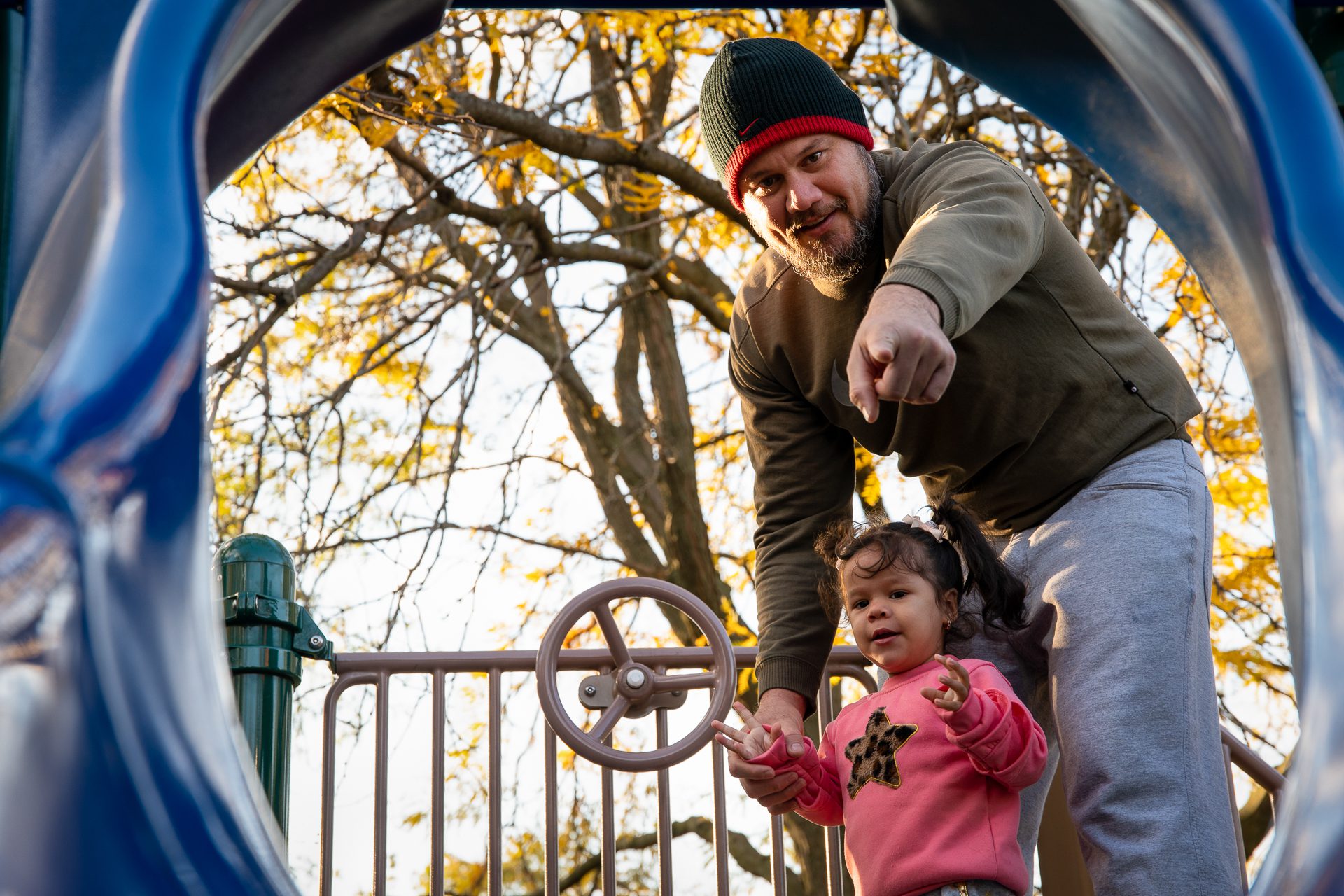
OLLARVES: La Patrulla Fronteriza se quedó con nuestros documentos y desde la frontera nos llevaron a El Paso. Nos entregamos y estuvimos allí tres días detenidos. Luis vino con nosotros, pero a él le llevó más tiempo, unos 22 días.
Nos llevaron a un lugar para darnos un documento que nos iba a identificar para que pudiéramos viajar a la ciudad que habíamos elegido. Después de eso, nos llevaron a un refugio en Las Cruces, Nuevo México.
El albergue comprobó que teníamos dinero para viajar. Nos hicieron el favor de llevarnos al aeropuerto y hubo un UNICEF asesor que nos ayudó a comprar los billetes para viajar.
ALVARADO: Mientras Luis estuvo detenido en El Paso, se encontró allí con otros centroamericanos que se entregaron como nosotros. Llevaban allí entre ocho meses y un año, así que temía que a él le pasara lo mismo.
OLLARVES: Cuando estábamos de camino a Estados Unidos ya teníamos la mentalidad de que íbamos a venir a Chicago.
ALVARADO: Elegimos Chicago por un vecino de Perú que vino aquí y quedó encantado.
Y yo, más o menos conocía Chicago por las películas americanas. Conocía Chicago tanto como la Torre Trump. ¿Quién no la conoce? El lago Michigan, el centro, esas cosas, pequeñas cosas. La historia que tuvo Chicago con los mafiosos, con Capone, ese tipo de historia interesante. No pensaba en Estados Unidos y en Chicago en comparación con otras ciudades.
Creo que había oído en un albergue de Panamá que Chicago era una ciudad que protegía a los inmigrantes. Yo no lo sabía, pero ya había elegido Chicago.
OLLARVES: Cuando llegamos a Texas y nos dejaron ir, empezamos nuestro viaje aquí.
Duramos tres días en el refugio de Nuevo México, luego nos entregamos un viernes y el martes por la mañana estábamos de camino a Chicago.
ALVARADO: Nos llevaron al aeropuerto de El Paso. Nos avisaron con treinta minutos de antelación y sin tiempo para ducharnos.
Por ahora, nos alojamos en una casa que pertenece al jefe de uno de nuestros antiguos vecinos de Perú. Nuestra vecina fue como nuestra intermediaria. Ella nos trajo a Chicago.
Hemos tenido algunos problemas con la casa. Las tuberías se congelaron y reventaron. Hay agujeros en el techo que hemos tapado con tela para que no se vieran. Lo hemos limpiado y el dueño de la casa ha visto todo lo que hemos hecho y no nos ha cobrado el alquiler de los dos primeros meses y medio.
OLLARVES: A diferencia de Perú, aquí tengo una cama donde dormir. Gracias a Dios tengo donde cocinar. Tengo una nevera pequeña pero que funciona. En otras palabras, hay una gran diferencia.
Estamos buscando hospital tras hospital para ver dónde pueden tratar a nuestra hija por su tos. Grecia ya tenía el vientre muy hinchado por haber bebido agua contaminada durante el viaje, porque era eso o morir.
Formamos parte de un grupo de mensajes en el que compartimos información sobre recursos. Pero, necesitamos algún tipo de identificación estatal para utilizar muchos de esos servicios.
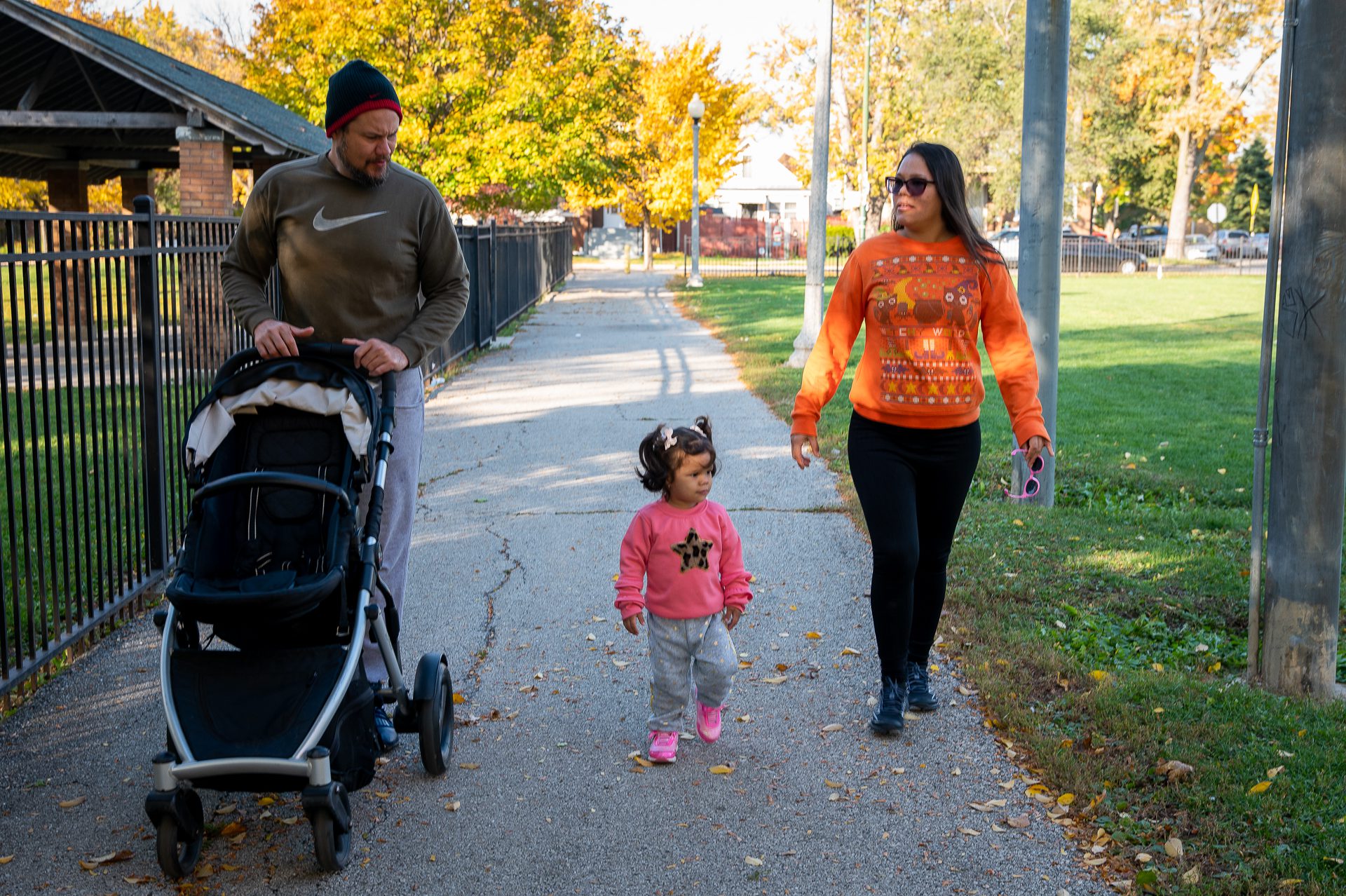
ALVARADO: También hemos estado en varios hospitales que nos han dicho que no volvamos, porque como "ilegales", hay lugares y albergues para cuidar a nuestro hijo enfermo.
Grecia fue tratada recientemente en un hospital de Humboldt Park. Más tarde llegó la factura a nuestra casa con un total de $645.
Como no tengo permiso de trabajo, trabajo como contratista de limpieza y construcción. Pinto casas, limpio jardines... cosas que puede hacer un inmigrante sin papeles.
Si tuviéramos mejores ingresos, podríamos ayudar más. No vinimos sólo por nosotros, sino por nuestros seres queridos que se quedaron en Venezuela. ¿Cómo podemos ayudarles?
La madre de Carmen necesita medicinas que en Venezuela son muy caras o no están disponibles. Así que hemos podido enviarle dinero.
No hemos tenido que gastar dinero en ropa, cosa que agradecemos mucho.
OLLARVES: Con el tiempo, me gustaría tener mi propia casita, coche, perrito... cualquiera de esas cosas, porque sería algo mío.
Creo que una vez que aprenda inglés, se me abrirán muchas puertas.
Alvarado dijo a Borderless que sueña con ser chef y que algún día le encantaría tener un restaurante con su mujer. Está buscando trabajo fijo en cocinas y le gustaría quedarse en Chicago. Ollarves encontró trabajo recientemente limpiando casas. Espera poder seguir estudiando pronto. Alvarado está matriculado en cursos nocturnos para adultos a través de la Asociación Polaco Americana de Chicago para aprender inglés. La pareja tiene como principal objetivo aprender inglés. Cuando él vuelve a casa, los tres practican juntos el inglés todo lo que pueden.
Este reportaje se ha realizado con el apoyo del Fundación Chicago Headline Club.

